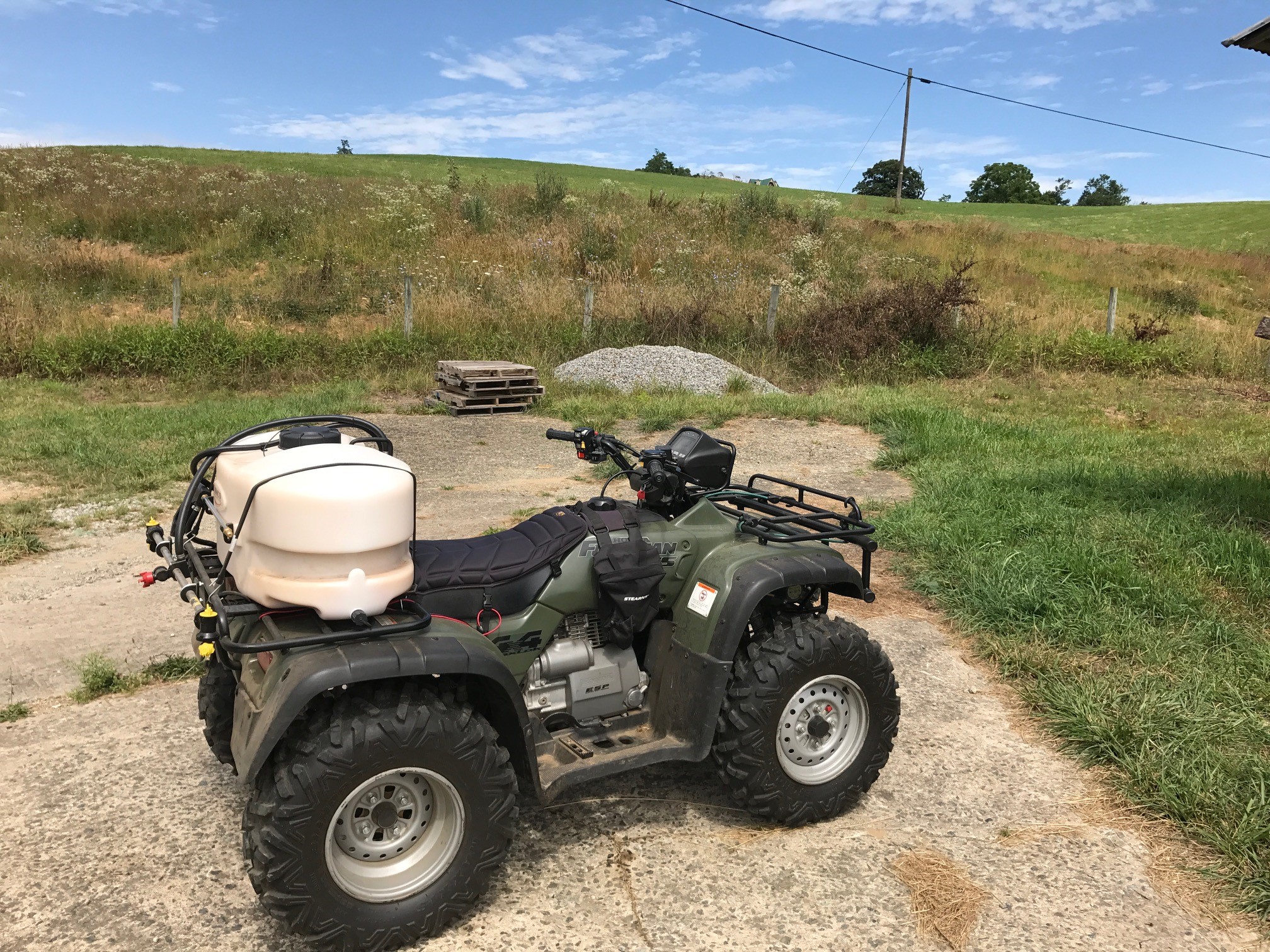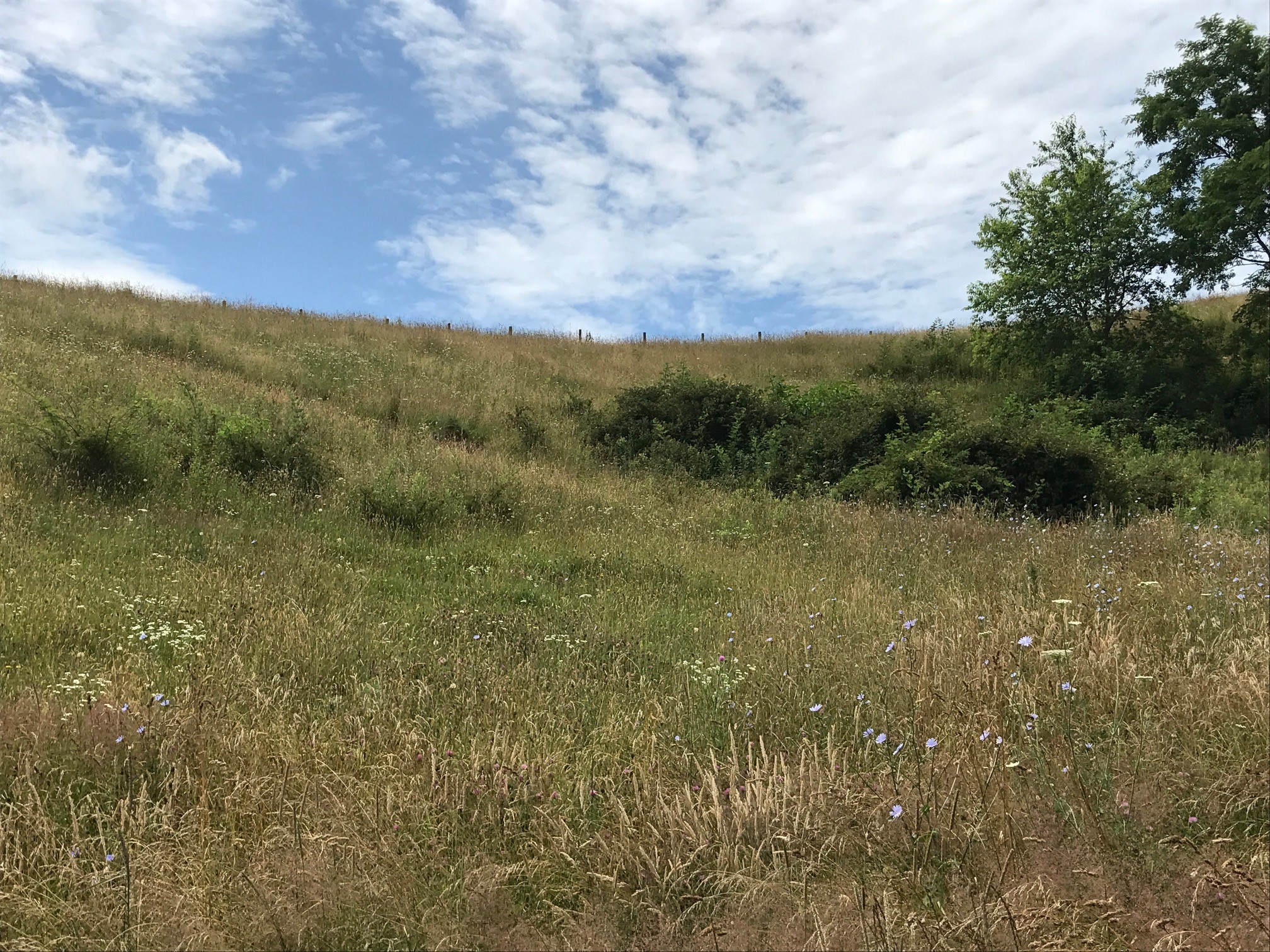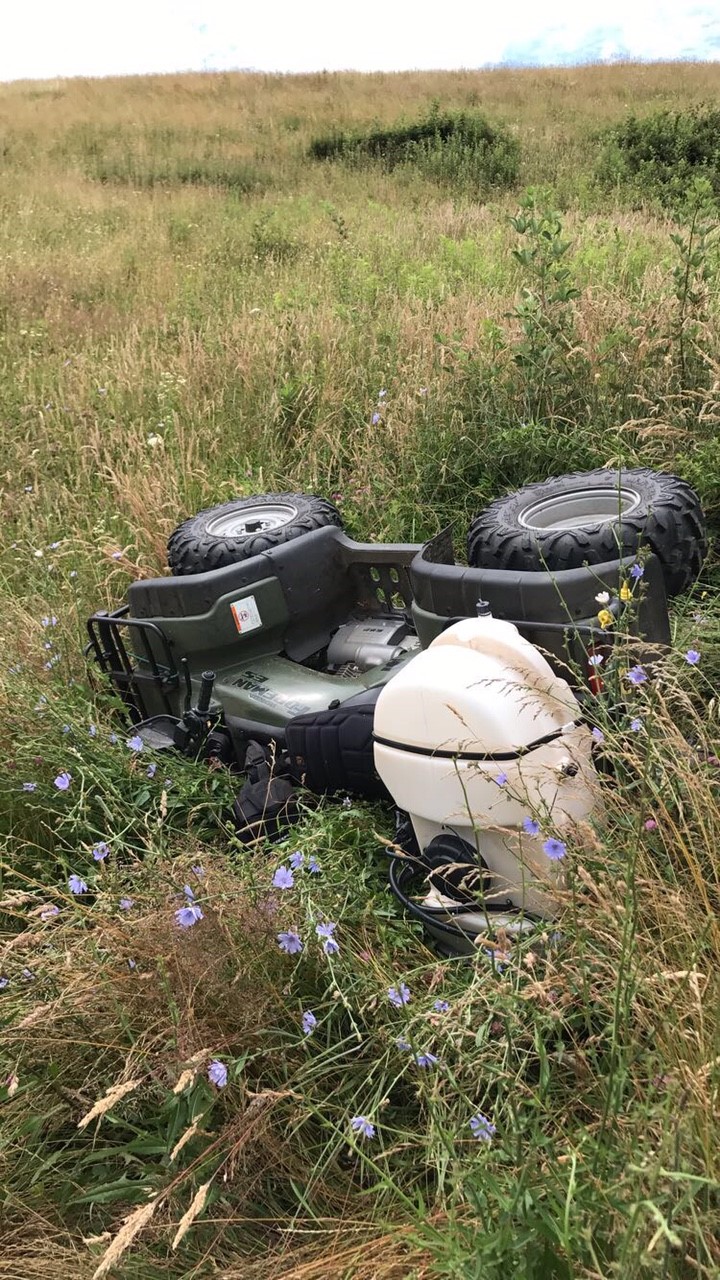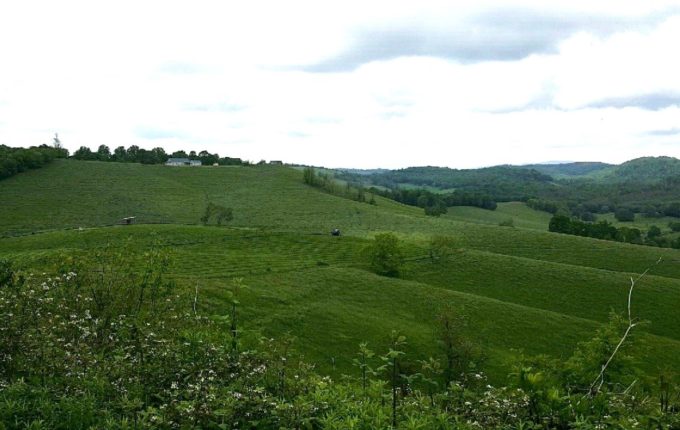My husband, John, and I belong to the weekend warriors: farmers who are dependent on off-farm income to sustain our families, provide insurance, and help plan for the future. We both work full-time jobs off the farm, have a toddler, families, friends, and church. As you can imagine, we don’t have a lot of spare time. Our farming is jammed into nights, weekends, vacation days, and holidays. Our time spent on the farm is carefully planned in advance; we divide and conquer to accomplish more tasks, and more often than not our to-do list gets precariously longer instead of encouragingly shorter.
While most folks had 4th of July plans to tan on the beach, my tan would come from wearing a tank top while spraying herbicides on multi-flora rose and blackberry bushes. While others drove the parkway, John drove the tractor to catch up on clipping our pastures. While families watched fireworks that night, we drove home with our sleeping toddler in the backseat.
 Our farming day started like most at our farm. My parents picked up our son to take him back to their farm for the day. John filled the tractor with diesel, and I mixed the tank of herbicide. Bluebird skies and no breeze told me it would be a great day for the task at hand. With no drift, I could get a LOT accomplished in the limited time we had that day.
Our farming day started like most at our farm. My parents picked up our son to take him back to their farm for the day. John filled the tractor with diesel, and I mixed the tank of herbicide. Bluebird skies and no breeze told me it would be a great day for the task at hand. With no drift, I could get a LOT accomplished in the limited time we had that day.
 On my second tank, I decided to head up a logging road cut through the pasture to take care of some blackberry canes that were both at the base of the road and at the top. I had finished spraying the bushes at the base of the road, and was heading to the top when the front, right side of the 4-wheeler started to rise, and in the blink of an eye, there was no doubt it was rolling.
On my second tank, I decided to head up a logging road cut through the pasture to take care of some blackberry canes that were both at the base of the road and at the top. I had finished spraying the bushes at the base of the road, and was heading to the top when the front, right side of the 4-wheeler started to rise, and in the blink of an eye, there was no doubt it was rolling.
 In the event of an accident, no one can prepare you for what is about to happen. Time seems to both stop moving and speed up all at the same time. Many details are vividly remembered, and many cannot be remembered at all. I was able to jump free while the machine rolled completely on its side, the engine killed on its own. It took a few minutes of standing and staring before I realized I was crying. It was hard to shut off everything going through my mind. A quick check showed I had scuffed my knees when I jumped clear and landed on the ground, but otherwise I was unscathed, at least physically.
In the event of an accident, no one can prepare you for what is about to happen. Time seems to both stop moving and speed up all at the same time. Many details are vividly remembered, and many cannot be remembered at all. I was able to jump free while the machine rolled completely on its side, the engine killed on its own. It took a few minutes of standing and staring before I realized I was crying. It was hard to shut off everything going through my mind. A quick check showed I had scuffed my knees when I jumped clear and landed on the ground, but otherwise I was unscathed, at least physically.
Then came the what-ifs. What if my son had been here (he never rides when I am spraying, so this one was a bit of a stretch – but what if?). What if I hadn’t jumped clear? What if it had gone all the way over? What if I had been pinned underneath? What if my husband hadn’t been there? Thank you, God, this could have been so much worse!
I was close enough to the truck to walk over to it and then shakily drive and get John. Through sobs, we talked about what happened. We had to chain the 4-wheeler to the front-end loader on the tractor to sit it up right, as the 25 gallon sprayer was completely full when it rolled. In the end, it turned out the only damage was a broken $3 rubber bungee strap that held the sprayer on the back rack.
Once upright, it was easy to see what happened. When I started up the logging road, the 4-wheeler was too far to the right, so instead of driving up the road, the right side drove up the bank, got top heavy and physics and gravity did the rest. The grass around the road was as tall as the 4-wheeler, so there was no seeing it. Our farm is mostly flat land – this was the umpteenth sprayer I had put out in two months on a machine I’ve driven for the past five years.
My accident is the same formula for most farm accidents – a task that is routine in an area the farmer is comfortable. So what can be done to limit or reduce the occurrence of farm related accidents?
- ALWAYS keep a cell phone.
This one is hard for us because John and I have different cell carriers, and his phone does not have reception at our farm. Instead, we use long-range walkie-talkies so that we can communicate. We’ve even discussed getting a track phone for him to carry at the farm, because I’m not comfortable with him being there alone with no way to notify anyone if there is an accident. Many farmers I’ve talked to personally and professionally who have been involved in accidents have been the ones to call 911 because they are farming alone – many farming tasks are one-person jobs. - ALWAYS let someone know where you are, and have a check in time.
The buddy system is your friend in farming. Even though we’re on the same farm, the bulk of the time we’re not in the same place so John and I will have check in times – if you haven’t seen or heard from me in 2 hours, come find me. For those who know you’ll be alone all day, set times to call and check in with family members. Every farmer has crazy names for their fields and pastures (we have The Valleys, The Back, Silo, Barn, Upper Barn, etc.), let someone know exactly where you plan to be that day, and if you finish your task and move to another location, let your buddy know that you’re going somewhere else. - Scout where you’re headed before going out to complete your task.
I know, I know, the ox is in the ditch and you don’t have TIME TO SCOUT. Do you have time to buy a new piece of machinery or recover from an accident? Heavy rain can cut ditches you can’t see, cold winters can push up rocks that weren’t there the day before, hard winds can blow down trees and limbs. While not completely unavoidable, a quick dry run can reduce some headaches. - Putting additional weight on an ATV or RTV changes the way it handles on rough terrain.
This is exactly what happened to me. Had the sprayer not been full the odds of rolling would have been greatly eliminated. Passengers, sprayers, bags of feed/seed/mineral/fertilizer, etc. all add additional weight, completely changing how the equipment handles. Speeds should be reduced when driving, and steep climbs should be avoided. - Have a good first aid kit in your tractor and truck.
John likes to constantly remind me that diesel fuel and kerosene are NOT antiseptics. You never know when an injury might happen, but many times, having supplies on hand to assist with an injury aren’t thought of until after it happens. The National Education Center for Ag Safety has a high-quality kit designed for farmers that runs $40 per kit. The retail price is reduced thanks to sponsorships and can be purchased here: http://www.necasag.org/farmfirstaidkit/ - Make sure rescue workers can find your field/pastures.
Our farm does not have a 911 address, but we do know the GPS coordinates. In the event of an accident or emergency, rescue workers can access our farm via those coordinate. If you do not have 911 numbers (if you have multiple farms, each needs a number), GPS numbers can easily be obtained via smart phones and stored there. - If your equipment doesn’t have Rollover Protection Structures (ROPS), it should.
Both of my dads (bio and step) have rolled tractors, both were in places they’ve driven tractors all the time, both survived with no injuries to themselves. My step-dad was in a situation similar to me – he was spraying Christmas trees in a tractor with a cab – and his tractor was totaled. My dad was putting out hay in winter when his tractor slid. It did not have a cab, only a rollbar, but that tractor was not damaged. In both instances, had it not been for the ROPS (a cab is considered a ROPS), the rollovers would have been deadly. NC Farm Bureau will cost share $500 for members to have ROPS installed on tractors that did not come with one factory installed. For more details, visit the NC Farm Bureau Safety page: https://www.ncfb.org/Programs/Safety - Children completely change the game.
Our 17 month old son doesn’t go to the farm with us often, even though we want him there. Most of our tasks aren’t conducive to tiny hands attached to a tiny body that can’t sit still and doesn’t like the word “no.” I can walk away from an accident shaken up, but if something happened to my son . . . I can’t imagine my child suffering a major farm accident. Because we don’t have a designated play area, our son will usually go to his grandparents’ or aunt’s house. Once he is old enough, he will be assigned age-appropriate chores.
These are just some tips and advice based on my experiences on the farm and is certainly not a comprehensive safety list. You can also review NCFB’s Farm Safety Checklist and NECAS’s safety resources, videos, and webinars for more tips and education. If you’re a farmer, I encourage you to make safety an everyday priority – be prepared and be safe!

